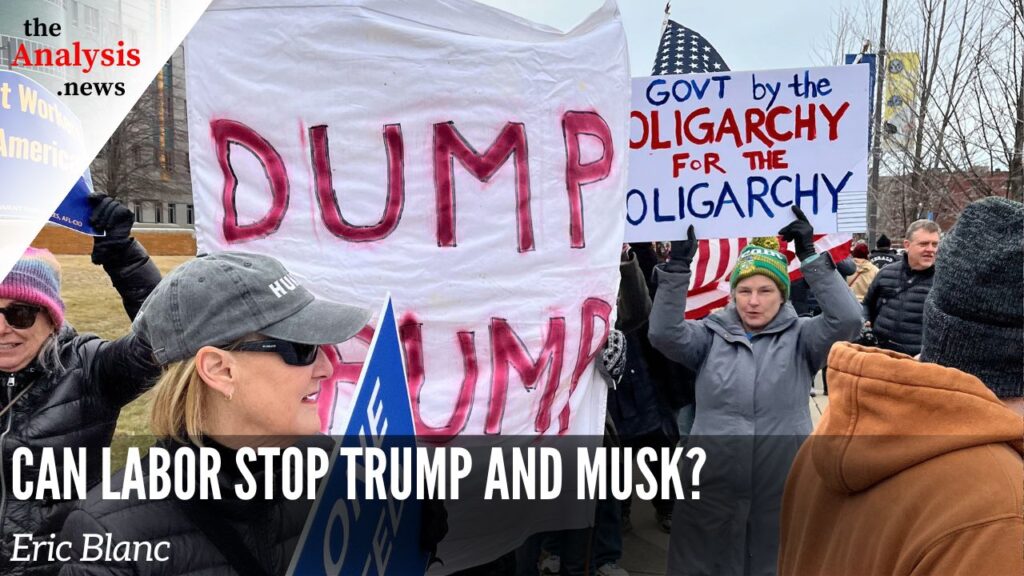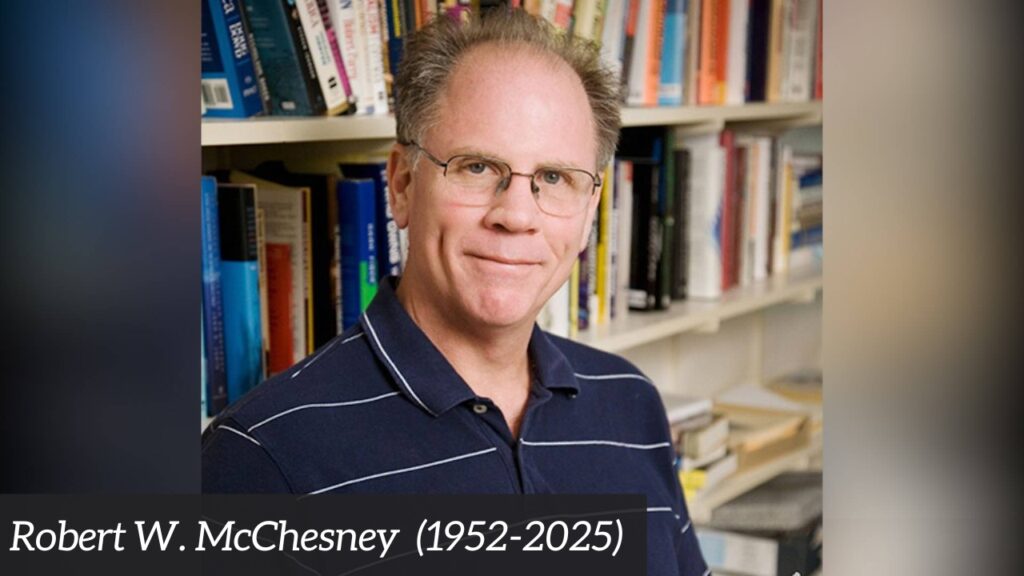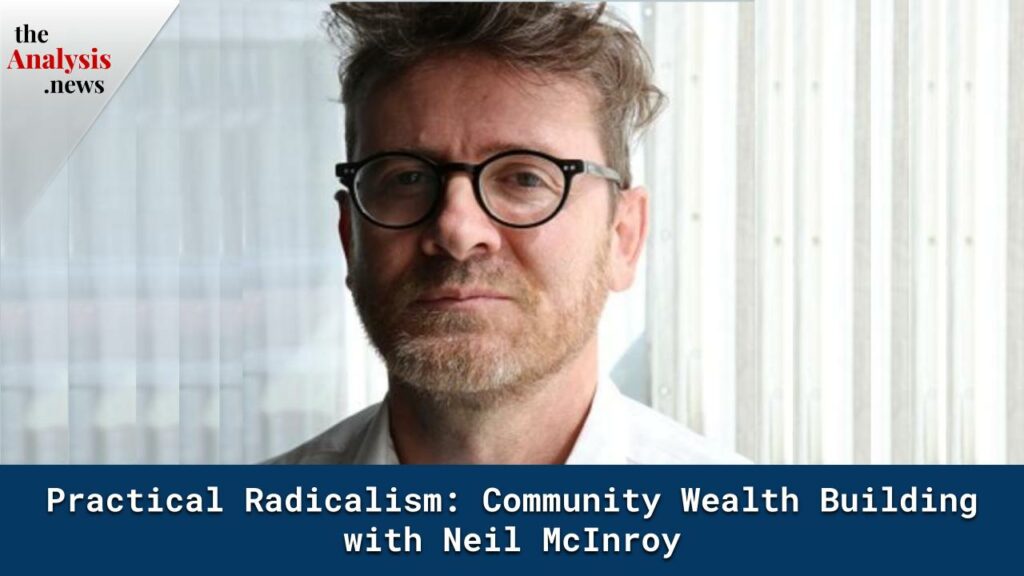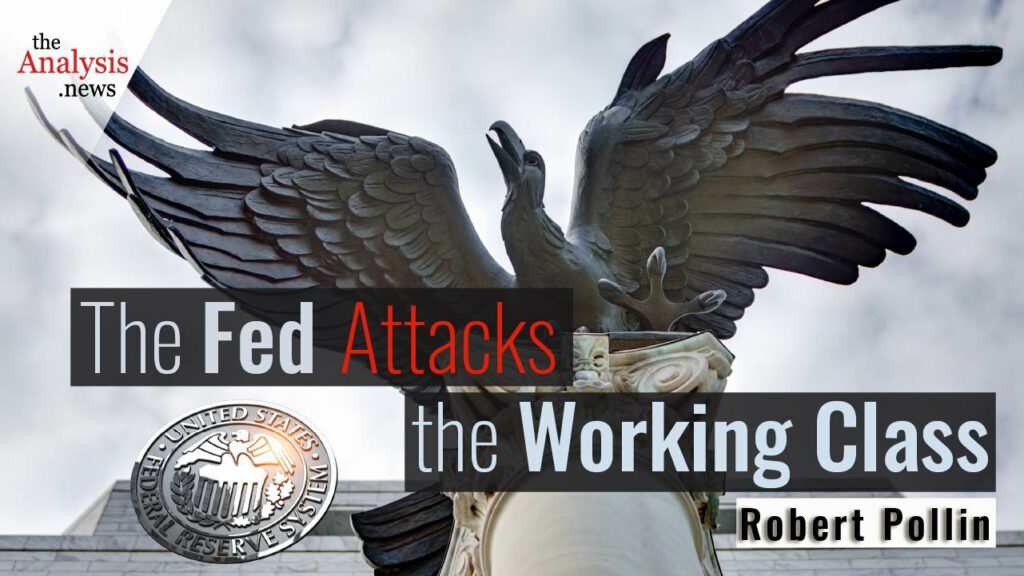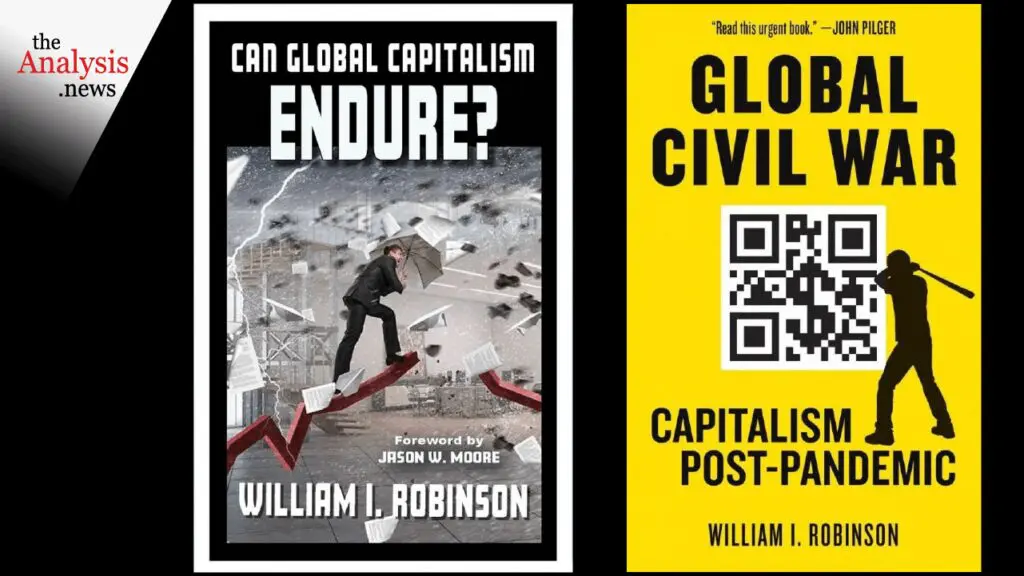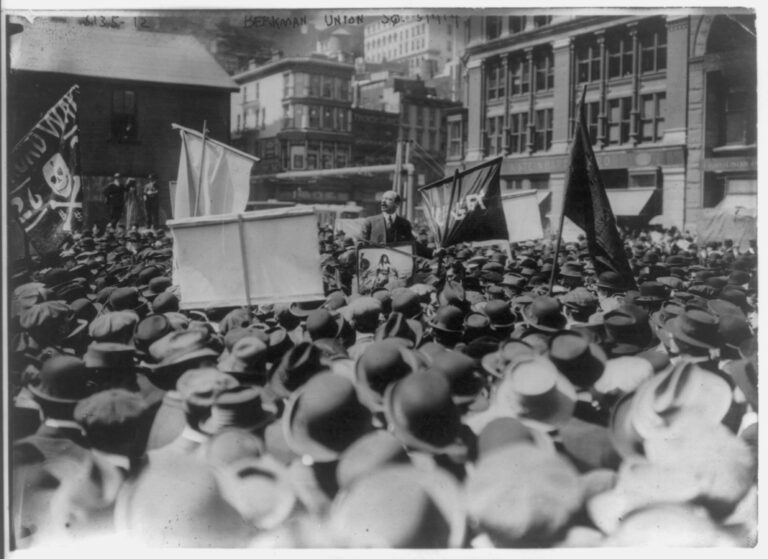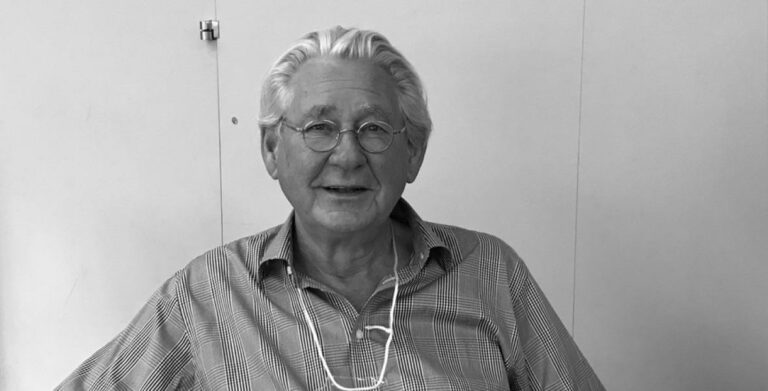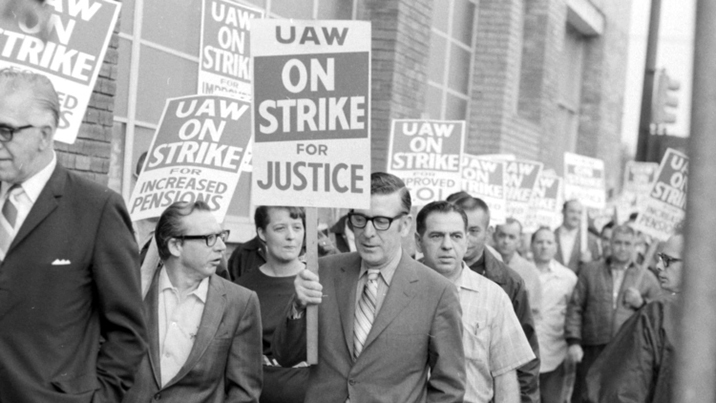The workers’ council movement took shape in several forms across Europe, Russia, Tito’s Yugoslavia, Algeria, and Iran. Political scientist Dr. Saeed Rahnema discusses the failure of workers’ councils in these different historical contexts and traces out the tensions between workers’ control and workers’ participation under capitalism. Is real workers’ control feasible under capitalism, and do struggles for increased workers’ participation and higher wages necessarily lead to workers’ control?
Workers’ Movements in Revolutionary Iran and Europe – Saeed Rahnema part 2/2
Talia Baroncelli
You’re watching theAnalysis.news, and I’m Talia Baroncelli. Today, I’ll be joined by political scientist Dr. Saeed Rahnema. We’ll be discussing the issue of workers’ control and workers’ participation in councils.
If you’d like to support us, please don’t hesitate to go to our website and give us a boost. You can hit the donate button at the top right corner of the screen and make sure you get onto our mailing list. Like and subscribe to the show if you can on YouTube or other podcast streaming services such as Spotify and Apple. See you in a bit with Saeed Rahnema.
I’m very happy to be joined by Dr. Saeed Rahnema. He is a retired political science professor as well as professor of public policy at York University in Toronto, Canada. He was the director of the York School of Public Policy and Administration and a director of the non-profit Middle East Economic Association. He was born and raised in Iran and was a member of the Industrial Management Institute there.
During the Iranian Revolution of 1979, he was a leading activist in the left and workers’ council movement, as well as being a founder and member of the executive of the Union of the Workers and Employee Councils of one of the largest industrial conglomerates in Iran, known as IDRO.
His recent publications include The Transition From Capitalism as well as Neoliberal Imperialism: The Latest Stage of Capitalism. We’ll be discussing some of these works in future interviews, but today, we’ll be largely focusing on workers’ councils. It’s really great to have you here, Dr. Rahnema; thank you.
Saeed Rahnema
Thanks for having me. Good to see you. That’s great.
Talia Baroncelli
It’s nice to see you virtually, of course, since you taught at York for many years, where I also attended, but sadly never attended your course on War and Peace in the Middle East. It’s great to see you here now.
Saeed Rahnema
Sure.
Talia Baroncelli
Two years ago or so, you wrote a really interesting piece called The Inconceivability of Real Workers Control Under Capitalism. This was published in the International Labor and Working Class History publication, which is a really well-known journal looking into labor struggles and that sort of thing. This might have come as a surprise to some people who perhaps know some of your history, given the fact that you were a large proponent of workers’ councils and worker’s control in Iran.
During the Iranian Revolution, you were a founder of one of the largest union of workers and employee councils known as the Showras, which arguably contributed to the downfall of the Shah’s regime. It’s really noteworthy that you wrote these particular pieces criticizing what you call the inconceivability of workers’ control.
In 1992, you also wrote another piece titled The Illusion of Workers Control. For someone who was such a large proponent of workers’ control and workers’ councils, to then talk about the illusion of workers’ councils is really quite a shift. Maybe you can explain what led to this particular shift in your view and what you think has been the main cause or reason for the failed movement of workers’ management and workers’ control.
Saeed Rahnema
By all means, yes. First of all, happy first of May. It’s a great day that we have this discussion. First, I would like to make several points for clarification. As you know, the discussion of council movements and workers’ control deals with two levels of organization: at the workplace for control of production and also at the political system for control of levels of power. My focus is on the first one, although it’s very much related to the second one, as I will discuss.
I differentiate between managerial councils, which are self-management, and also participative councils, where workers participate along with managers.
In the beginning, I would like to emphasize that while I’m critical of councils, I do believe that the emancipation of the producing class, using Marx’s terminology, is not possible as long as the appropriating class controls the production processes. The precondition for the liberation of producers of wealth is the takeover of control of the production process, no doubt about it. But the key is that under what circumstances and how can such a major transformation take place?
Well, as you mentioned, I was a serious believer in the council system, and I’m still for the future, but not for the present. I was inspired by the Russian Soviets and had the chance to be practically involved in such a movement during the [inaudible 00:05:32] revolution. With this disastrous failure, at a later stage, I had the chance to study and review all the major councils throughout history. Then, I came up with a different conclusion.
The starting point of all of these cases, of course, as you know, is the Paris Commune, where Marx initially was very much impressed by it, called it a political form, at last discovered. Although, at a later stage, he drew a different conclusion and said, “This was a rising of a town under exceptional conditions and that the majority of the Commune was in no sense socialist, nor could it be.” He even said that a simple compromise with Versailles maybe would have produced better results.
Then we have the Soviet or Russian councils of 1905 and 1917, both in February and the October revolutions. We had the Russian factory committees, which are the councils at the workplace. We have the German, historically, major instances are the German Räte during the German Revolution of 1918-1919. Then we have the Italian Internal Commissions during the so-called Red Years of 1920, and then the Spanish, Polish, Hungarian, and finally the Iranian case.
All of these councils were products of a major political crisis, and they were eliminated once the crisis was over. This was a very important conclusion. I’ll give a few examples here. For example, the Russian Soviets played an important role in several Russian revolutions; Lenin called them organized forms of dictatorship of the proletariat and organs of political power that soon became rubber stamps of the Communist Party. The dictatorship of the proletariat became the dictatorship of the party, and then eventually, a dictatorship of a leader under Stalin.
The factory committees, which are the focus of our attention for workers’ control, played a very significant role in managing many of the companies during the revolution. In 1918, they were transforming into state-run trade unions. Later, they became part of a troika, a triad of the Communist Party cell of the factory, the union, and the management. Eventually, under Stalin, it was disbanded. Of course, after Stalin, some of these councils continued, but they were organs of the state, mostly for managing the affairs of the state policies rather than workers’ control.
In Germany, the factory councils were very significant during the revolution that I mentioned, 1918-1919. Because of the differences among Socialists and Social Democrats and their internal weaknesses, they were eventually disbanded. We see the same thing for the very famous Turin Councils of Italy. All of these were short-lived.
There were instances that some of the councils lasted longer, like in Yugoslavia under [Josip Broz] Tito in the 1950s or in Algeria under [Ahmed] Ben Bella in the 1960s, and also more recent cases of Venezuela under [Hugo] Chávez. This was because of the state’s protection and affiliation with the party power. This tells us how significant the relationship is between the central organs and the councils and whether the councils can survive or cannot survive without their support. But they demised when the political system that was supporting them changed.
We have other types of workers’ council, as you know, after the second World War in Europe. But these worker councils are very different. They were a mechanism of workers’ participation, and they declined, as you know. This is a very brief background of the cases that I have studied.
Talia Baroncelli
Well, that’s a really interesting historical overview because there are numerous different cases there. You bring up the case of Yugoslavia, for example, under Tito, and how the workers’ self-management councils were largely more successful than in the other cases, say in the cases of the Soviets, for example, in the former Soviet Union, or actually in 1905, before it became the Soviet Union, and as well in the German case, in the second revolution of 1918-1919, which you discuss, and in Italy.
If I understood correctly, you’re saying that the councils were only largely successful if they actually had a state in state power, if they were somehow involved in parliamentary control and state power. Without the support of the state or without having direct access to the levers of power, there were various instances in which they fizzled out. Of course, those historical examples will be different, and we could speak about that more later. Would you say that that is the main reason why the councils didn’t work, they didn’t have the state power?
Saeed Rahnema
Yeah, this is definitely one of the main reasons. Here we are talking about large industries, major industries. For smaller industries, of course, it’s possible. Very small workshops can be owned by workers and councils. We are not talking about those. It’s about major industries. This involves ownership. In order to be able to manage, you need to own the factories. This ownership should come through socialization and socialization of means of production. I will discuss different types of it.
Without the support of the state, these large industries could not possibly survive. Even in those cases, as I mentioned in Yugoslavia, which was one of the longest periods of time that councils were in control was because of the policy of the state. But that changed, and later, this was shifted to market socialism. It became part of the participation of the workers, and then eventually after Tito, it changed completely.
There are other factors. The preparedness of the working class is very significant. In none of these cases, workers were ready because it takes a long time to be able to learn to manage these factories. Also, in many of the cases, these are not workers alone, but also the middle class, the engineers, the managers, and their role is very significant. If needed, I will discuss it. With them, there are some problems. Without them, control was not possible.
Talia Baroncelli
There’s obviously a larger theoretical debate about workers’ councils and what conditions are necessary in order to support workers’ councils and worker self-management. I think your critique would be that the various recent contributions towards these different ideas of worker self-management have lofty ideas of democracy, and they want to be able to put these ideas into practice, but they’ve largely failed. I think that is what you argue. Perhaps this is because of a historical blind spot, not actually looking at the historical instances in which the councils were successful or were not successful. Maybe you could speak about some of the recent contributions to this theoretical debate on what is necessary for workers’ councils and perhaps why you would say they’re not really accurate in terms of identifying why the councils were not successful.
Saeed Rahnema
Very good question. If I may, I would like to explain a little bit in detail without taking too much time.
Talia Baroncelli
Go ahead.
Saeed Rahnema
Theorization about workers control, historically, we can see three waves of theorization. The first one, the very early one, the original ones, are early 20th century. Then the second wave we have from the mid ’50s to the ’70s, and then the third one we have in the 21st century. The continuation of each other. I see several problems in these theories. There are so many ambiguities that many theories have not explained.
The original theorists, such as Anton Pannekoek, Herman Gorter, and Karl Korsch, were critical of what Bolsheviks and German Social Democrats did to the Soviets and councils. They were right in that because of so many problems that they were involved. They advocated for the workers’ council as the sole organization of the working class. They didn’t want any parties. They didn’t want any unions. They thought these were the problem. Only workers can do it. For example, Pannekoek mentioned autonomous activity by the masses. All the focus was on them. Even Gorter was saying that labor unions, parliamentarians, all of these things are unnecessary or a problem, and the proletariat must make the revolution alone.
Talia Baroncelli
Sorry, just to interrupt. For people who don’t know, Pannekoek was writing around–
Saeed Rahnema
1920s.
Talia Baroncelli
Yes, the 1920s. Around the time of the failed second German Revolution.
Saeed Rahnema
Yes. Actually, in a sense, he’s the founder of councilism. It’s not only for the workers’ council but also for workers’ control at the national level. In modern times, it has become a council/republic as opposed to a parliamentary republic.
As I mentioned, they were right about their criticism of the Bolsheviks and the Soviets. I mentioned very briefly and rapidly what happened. They were not clear on how workers alone would be able to control all the affairs of society.
It’s interesting that Pannekoek and others were insisting on councilism at the time that the majority of the working class had sided with the right wing of the Social Democratic Party, which had taken the parliamentary path rather than Soviet-type, the councils favored by the USPD [Independant Social Democrats], the Independence, the Spartacists, and then the Communists.
It’s interesting that in the first Congress that was formed, the Congress of Workers’ and Soldiers’ Councils in Germany, close to 490 delegates, the vast, vast majority voted for the Parliamentary Republic. There are lots of details. We have a criticism of Rosa Luxemburg and this, which we don’t have time to get into.
Some of them, of course, like Karl Korsch, recognized this rightly that the failure of the German Revolution was the result of lack of ideological preparedness of the working class. This is very significant at that time. I must stress the need for further education, consciousness, and mobilization.
Korsch, in terms of theorization, has contributed most of all because some of the issues that he raised at that time were later repeated without adding anything to it. Korsch linked the workers’ control to the question of socialization of ownership. You cannot have control without ownership. He saw socialization either through expropriation, nationalization, or communalization, taking place all at once through a revolution like what happened in Russia, China, and most of the social revolutions. Or gradually, for example, people like [Eduard] Bernstein. He recognized these two types, but he was, of course, against any gradual movement. He was very radical. He said that we should move toward eliminating completely the private property owners from the social process of production. This is a policy that the Soviets did immediately with all the problems.
In another series of studies, I revisited socialist revolutions. I explained how most of these revolutions moved toward immediate total socialization, and all of them failed. All of them had to change the policy. Even Lenin changed it. Unfortunately, Stalin, when he came to power, followed the same old policy. Also, when we talk of, for example, socialization, it’s interesting. At the same time, Karl Kautsky was, as you say, responsible for the Socialization Committee of the SPD, the Social Democratic Party, when they were in power.
Talia Baroncelli
In Germany?
Saeed Rahnema
Yes, in Germany. He recognized two significant problems of bureaucratic autocracy and labor aristocracy. The first one is when private capitalists are replaced by an undemocratic bureaucracy. The second one is when all authority is transferred to a privileged group of workers. He said that these two are problematic. But in order to resolve this problem, he said that we need a dual power. Parliament would control nationwide, and councils and workers would control the factories.
Korsch was in agreement with Kautsky on this, but the difference was that Kautsky wanted this socialization to take it step-by-step, sector-by-sector, but Korsch wanted it immediately. Another contribution of Korsch was recognizing the contradiction between producers and consumers. You see that if you only focus on producers, the privileges that they get and the costs that are involved will have some impact on the consumers. Ironically, consumers are also workers of another factory. We need to recognize and reconcile this problem, which is a very significant and important thing. Later, I will touch on it. These were the early theories.
Talia Baroncelli
Yeah, these theories were largely developed during the First World War, and then this really interesting period during the First World War leading up to the second German Revolution.
Saeed Rahnema
As you said, it’s the First World War, and you see all the socialist revolutions and movements in different parts of Europe. I just mentioned Germany, but we see it in Poland, Hungary, and many other places. There was a major workers’ movement. In many cases, it moved toward some sort of workers’ control. This was a period of revolution. When the revolution failed, when the right wing took over, the situation changed.
Talia Baroncelli
Because there was tension within the German Social Democratic Party, there were more right-wing elements of the party versus more left-wing elements represented by Karl Liebknecht and Rosa Luxemburg. As you mentioned, they were more in favor of this workers’ council, having direct control rather than a parliamentary form of trying to change or redistribute power. I guess their main goal was to have party unity.
There was a large criticism of them because, leading into the First World War, more left-wing members of the party were opposed to the war, and they were trying to form an anti-war movement. Then, in the end, they actually ended up voting for the war credits and supporting the First World War, and some of them took very nationalistic positions. That’s an example of how this idea of having unity within the party in order to be in power resulted in the betrayal of many of these values, which are so important.
Saeed Rahnema
You’re absolutely right. Both extremes were, of course, the problem usually focuses only on the right wing aspect of the SPD, but also the left wing problem. I have in detail written about this, but I don’t want to get into it now. Both sides were responsible for the failure. As you said, rather than having unity, they started fighting with each other. Then, of course, we know the results. The failure of the German Revolution meant the failure of the Russian Revolution. Even Lenin, [Leon] Trotsky, and others were hoping that if the German Revolution was successful in the second most advanced country of the time, then Russia would be in a good place. But that failure led to other things.
Anyway, these are the original theories that were left for a while. Then, after several decades, we see in the mid-1950s, new theories emerged. People such as Cornelius Castoriadis, Antonio Negri, the Autonomist, Hannah Arendt, Ken Coates, and Ernest Mandel; there are many of them. They focus on autonomous and independent leadership by the workers, by the workers and for the workers. But in practice, none of them could succeed anything. Again, it died down for a while. This is the second wave of theories that I mentioned.
It’s interesting that the theorization that came after the 1970s was taking place during a time when major changes were taking place in capitalism. Neo-liberalism was emerging. There were lots of changes. We were moving from Fordism and even post-Fordism, moving away from standardized mass production in centralized large factories to flexible specialization and the breakdown of the production process into clusters of many smaller industries scattered around the globe. This would make everything much more difficult for workers to control.
In the Fordish model, you had large factories with all the processes in one location. Now, in the process of the same Ford company, you have hundreds of major industries scattered around the world that have the second tier and third tier. In this situation, this was taking place and the workers’ control was becoming more difficult. Unfortunately, while some theorists referred to this, in the era of neo-liberalism, what has changed? Some said, “Well, there is no difference. In any case, workers can gain control even at this time,” which I very much disagree with.
For several decades, the theorization almost dies down. Then, the third wave started in the early part of the 21st century when we had the [Euro] Square movement; we’ve got the Occupy movement. Impressed by all of these things, we have several major books come out that are very important books describing cases. I’m not going to name or refer to them here. None of them explain how you can have workers control, real self-management in a situation where the capitalist controls everything, and neoliberalism has broken down all of these major industries, and how it is going to be possible. This was very brief. Lots of things can be said about it.
Even in terms of not only workers, but in terms of the cooperatives; cooperatives are also mostly small and medium. They can be successful. But the large corporations and the large cooperatives cannot avoid capitalist systems. The best example is Basques Mondragon Corporation. I’m not going to say anything bad about it because it’s an amazing company, a huge company. But it’s operating globally and taking advantage of cheap labor in Central and South America, while the management system is definitely more progressive, and there are fewer differences among them. But again, we have wage differentials, and then many of the managers of the companies of the corporation are professional managers. We cannot say that this is workers’ control.
We also have Argentinian cooperatives, which were imagined after 2000. Those are also very much reliant on whether the state can support them or not. With the changes taking place in Argentina now, unfortunately, the right wing, I don’t know what will happen. Anyway, very simply put, some of the theoretical questions that are not answered are: How is worker control possible without ownership?
Talia Baroncelli
Well, that was my next question because this is the crux of what you’re talking about: what you call this catch-22 between workers’ control and workers’ participation. Your historical work has shown that real workers’ control in which it’s not the capitalists who are co-opting the struggle, but the workers themselves who are driving political change and who are in control of the means of production, that is not, in fact, possible under current capitalist conditions. Real workers’ control is only possible in a post-capitalist society, and you would argue that there would have to be some form of democracy as well. So, this transition is required. But it’s not workers’ participation that gets you to that transition to a post-capitalist society in which workers’ control is really possible. But workers’ participation is necessary to improve the living conditions and working conditions of workers. Things like the minimum wage, better conditions in factories, at the workplace, or in the knowledge industry, or whatever it might be. Participation is still necessary to get to a certain standard, but it could also lead to deradicalization or to other elements, such as the managerial class or the upper echelons of the capitalist class being involved in workers’ participation and resulting in a deradicalization of that movement.
This is really the contradiction. You can’t have true workers’ control without a change in the system. But what should people do? Just not fight for any improvement in their condition or participation. What would you say to that binary or that tension?
Saeed Rahnema
Yeah, it’s a very good point. Of course, proponents of workers’ control say, “No, it’s possible that we have workers’ control under capitalism,” which I question. But the question is that if workers’ control is not possible under capitalism, at the same time, we know that workers’ participation also has its own problems.
Workers’ participation came through the corporatist tripartism that emerged in different countries of Europe. While it had many successes, it also had its failures. Part of it, they argued that this is against class struggle and also this is deradicalizing.
The argument is that if workers’ control is not possible and workers’ participation deradicalizes workers and dilutes class struggle, then what should be done? This is the catch-22 that I mentioned. The whole idea is that we can have participation, but with a different situation.
Why did tripartism fail? Because we are in a situation where the capitalists are so powerful. Capitalists state mainly represent the interests of capitalists. The tripartism is very obvious. The workers are very weak. At the same time, here, I didn’t mention the changes in the working class. There have been lots of changes in the working class. The working class is not the way it was depicted or expected in Capital by Marx, later by Lenin, and others. We have a very highly segmented working class now. We have new classes. We have the new middle class. Here, even the theoretical notion of working classes is problematic.
Should we consider all those who sell their manual labor and mental labor as working class? Well, in relation to capital, yes, all of them are workers. But socially, politically, and culturally, they are very different. I really do not agree with those who said that all of them are workers. They are highly differentiated, and I believe that we should separate them. The working class is weaker. Capitalists are stronger. The capitalist state, through tripartism, failed in this case. But in order to be able to, we know that workers control is impossible, but participation in something that I call radical industrial democracy is possible. You would allow workers to gradually become stronger and stronger, more educated, and would be able to participate.
Talia Baroncelli
You’ve just been watching part one of my discussion with Dr. Saeed Rahnema. Join us for part two, where we’ll be discussing the necessary requirements to help enable workers’ control and workers’ councils. See you in a bit.
Podcast: Play in new window | Download | Embed
Subscribe Apple Podcasts | Spotify | Android | iHeartRadio | Blubrry | TuneIn | Deezer | RSS
Never miss another story
Subscribe to theAnalysis.news – Newsletter
Dr. Saeed Rahnema is an award-winning Professor of Political Science and Public Policy at York University. He was the founding director of York’s School of Public Policy and Administration. In his homeland, Iran, he taught and worked as a member of the executive of the Industrial Management Institute in Tehran. He has also served as an officer of the UNDP, as a director of the Middle East Economic Association (MEEA), and as a member of the editorial boards of several journals. He is a frequent commentator on Canadian and international media on the issues of the Middle East and Islam. He is the author of several books and numerous articles in English and Persian on topics such as religious fundamentalism, secularism, left and labor movement, diaspora, and multiculturalism.

